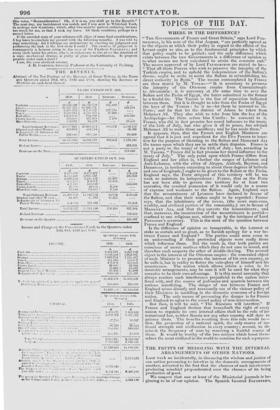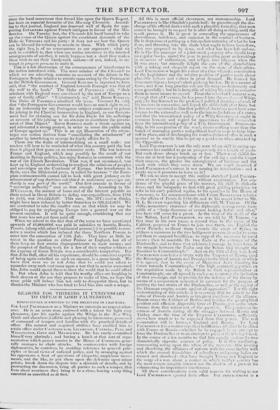THE FRUITS OF MEDDLING WITH THE INTERNAL ARRANGEMENTS OF OTHER
NATIONS.
LAST week we incidentally, in discussing the wisdom and justice of one nation prom/Ding to interfere in the domestic arrangements of another, adverted to the filet that the chances of such interfrrence producing mischief preponderated over the chances of' its being productive of good. We suspect that one at least of the Ministerial journals is be- ginning to be of' our opinion. The Spanish General ESPAUTERO,
since the local movement that forced him upon the Queen Regent, bas been an especial favourite of the Morning Chronicle. Accord- ing to that journal, England has deserved well of Spain for sup- porting ESPARTERO against French intrigues in favour of the ..Mo- &ratios. On Tuesdag last, the Chronicle felt itself bound to take up the cause of the Queen against the exorbitant demands of the Duke de VITTORIA and his party : it does not see how the Queen ean be blantedfor refusing to accede to them. With which party the right lies, is of no consequence to our argument : what we seek to establish is, that when one nation interferes in the internal arrangements of another, it rarely happens but a short time makes them wish to see their handywork undone—if not, indeed, to at- tempt in propria persona to undo it. This is a liar illustration of the consequences of interference to the nation interfered with. The same number of the Chronicle to which we are adverting, contains an account of the debate in the Portuguese Senate relative to certain stuns owing by the Portuguese to the British Government. General RAIVOSO is reported to have said, that "the conduct of England towards Portugal was that of the wolf to the lamb." The Duke of PALMELLA said, "their relations with England were considered by the rest of Europe as a sort of family affitir." " Unfortunately so," said Baron S.unirsa. The Duke of PALMELLA admitted the term. Viscount Ss said, that "the Portuguese Government would have as much right to ask for an indemnity for any Portuguese subject condemned to prison for joining in the Chartist insurrection in England, as our Govern- ment had for claiming one for Sir John Doyle for his sufferings on account of his joining in an attempt to overthrow the govern- ment of Don Miguel." Baron SABRESA made a tirade against us, and advocated a strong protest, in order to rouse the public mind of Europe against us." This is an apt illustration of the advan- tages one nation derives from " conciliating the attachment" of another by interfering to arrange its family affairs for it. These are the fruits of intermeddling on a small scale : our readers will bear to be reminded of what this country paid the last time it played that game on an extensive scale. The war between France and England, which may possibly be the result of our dabbling in Syrian politics, has many features in common with the war of the French Revolution. That war, if not occasioned, was kept up by England undertaking to readjust the relations of peoples and sovereigns on the Continent of ,Europe. Our interference in Syria, says the Ministerial press, is called for because " the Euro- pean conunonwealth cannot fttil to look with great jealousy on the advancement of any doctrines calculated to undermine soverogn au- thority in any part qf the world." Our first crusade in favour of " sovereign authority" cost us dear enough. According to Mr. M'Claccoeu, the amount of loans and of the interest payable on them raised in Great Britain to defray war-expenditure, from 1793 to 1S16, was 684,522,349i. This sum, Mr. 3rc, 1.3.oi.-ir thinks, might have been reduced by better financiers to 399,352,067/. We are contented to take the smaller sum as that which we may be obliged to pay for replunging Europe into a general war on the present occasion. It will be quite enough, considering that our first score has not yet been paid off.
• When we advert to the filet that of the sums we have mentioned upwards of 46,000,000/. was paid in subsidies to Austria, Russia, Prussia, (along with other Continental powers,) it is possible to con- ceive a motive which has induced the three Northern Powers to enter into the convention of 15th July. They have as little in- terest in the question as either France or England, but all of them keep on foot armies disproportionate to their means ; and the prospect of' finding work for a few of their surplus soldiers at the expense of Great Britain was a considerable temptation. But that John Bull, after all his experience, should be conceived capable of being again swindled to such an amount, is a gross insult. We know that were we to tell John that he could not atrord to squander away such vast sums upon a war that in nowise concerned him, John would spend them to show the world that he could afford it. But when John is told that his worthy allies are laughing in their sleeves at the use they propose to make of him, we hope the same pride will induce him not only to disappoint them, but to dismiss the Minister who has tried to lead him into such a scrape.



























 Previous page
Previous page